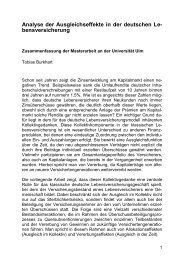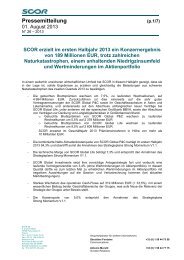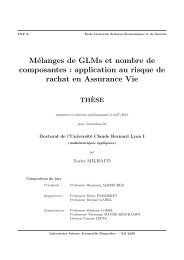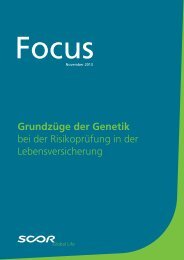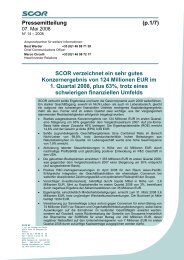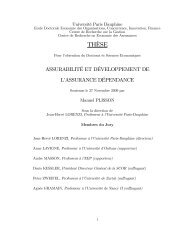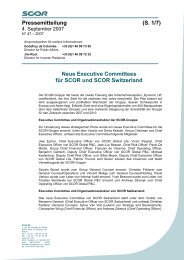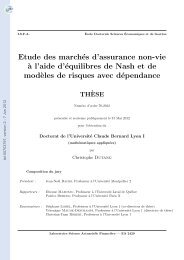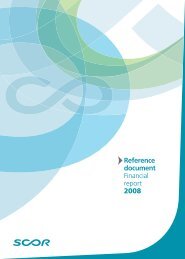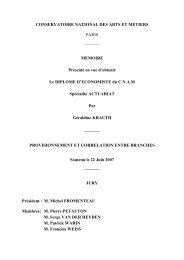4.4 Legal risk - Scor
4.4 Legal risk - Scor
4.4 Legal risk - Scor
You also want an ePaper? Increase the reach of your titles
YUMPU automatically turns print PDFs into web optimized ePapers that Google loves.
audits it carries out on the companies with which it does business, and its frequent contacts with these companies, the<br />
Group is still dependent upon such companies’ <strong>risk</strong> evaluations in establishing its reserves.<br />
As is the case for all other reinsurers, the inherent uncertainties in estimating reserves are compounded by the<br />
significant periods of time that often elapse between the occurrence of an insured loss, the reporting of the loss to the<br />
primary insurer and ultimately to SCOR. In addition, reserving practices may differ among ceding companies.<br />
Another factor of uncertainty resides in the fact that some of SCOR’s businesses are “long-tail” in nature, in particular<br />
long term care, whole life products, term assurance, longevity, workers compensation, general liability, medical<br />
malpractice or those linked to environmental pollution or asbestos exposure. For some of these businesses, it has, in<br />
the past, been necessary for SCOR to revise estimated potential loss exposure and, therefore, to reinforce the related<br />
loss reserves.<br />
Other factors of uncertainty, some of which have been mentioned above, are linked to changes in the law, regulations,<br />
case law and legal doctrines, as well as developments in class action litigation, particularly in the U.S.<br />
As a consequence of the difficulties described above regarding the reserving of <strong>risk</strong>s and their annual revision in Life<br />
and Non-Life, there can be no assurance that SCOR will not have to increase its reserves in the future, or that the<br />
reserves it constituted will be sufficient to meet all its future liabilities, which could materially impact its business, present<br />
and future revenues, net income, cash flows, financial position, and potentially, on the price of its securities.<br />
See “Section 6.1.3.5 – Reserves.<br />
4.1.6 SCOR MAY BE ADVERSELY AFFECTED IF ITS CEDANTS, RETROCESSIONAIRES, INSURERS OR<br />
MEMBERS OF POOLS IN WHICH IT PARTICIPATES DO NOT RESPECT THEIR OBLIGATIONS<br />
SCOR is subject to a <strong>risk</strong> of possible non-payment of premiums due by the cedants and/or to the possible non-respect<br />
by one or several of its commercial partners, of their commitments to the Group.<br />
The Group transfers a part of its exposure to certain <strong>risk</strong>s to other reinsurers through retrocession arrangements. Under<br />
these arrangements, other reinsurers assume a portion of its losses and expenses associated with losses in exchange<br />
for a portion of premiums received. When SCOR obtains retrocession, it remains liable to its cedants for that part of the<br />
<strong>risk</strong> that is subsequently transferred to the retrocessionaire and it must meet its obligation even if the retrocessionaire<br />
does not meet its obligations to SCOR.<br />
Similarly, when the Group transfers its own operational <strong>risk</strong>s to insurers, it is subject to the <strong>risk</strong> of the insurers not<br />
respecting their obligations. See “Section 4.6 – Insurance of specific operational <strong>risk</strong>s (excluding reinsurance activity).”<br />
Thus, the non-respect of financial obligations, in particular the payment of premiums, return of funds withheld and<br />
payment of claims, of SCOR’s cedants, retrocessionaires, insurers, or members of pools in which it participates could<br />
negatively affect its business, present and future revenues, net income, cash flows, financial position, and potentially,<br />
the price of its securities. The specific <strong>risk</strong> linked to the default of the retrocessionaires is provided in “Section 4.1.14 –<br />
SCOR is exposed to losses due to counterparty default <strong>risk</strong>s or credit <strong>risk</strong>s – B. Receivables from retrocessionaires.”<br />
4.1.7 SCOR OPERATES IN A HIGHLY COMPETITIVE SECTOR AND WOULD BE ADVERSELY AFFECTED BY<br />
LOSING COMPETITIVE ADVANTAGE OR IF ADVERSE EVENTS AFFECT THE REINSURANCE INDUSTRY<br />
Reinsurance is a highly competitive sector. As is the case for all other reinsurers, SCOR’s position in the reinsurance<br />
market is based on several factors, such as its financial strength as perceived by the rating agencies, its underwriting<br />
expertise, reputation and experience in the lines written, the countries in which it operates, the premiums charged, as<br />
well as the quality of the proposed reinsurance structures, the services offered among others in terms of claims<br />
payment. Nonetheless, the Group competes for business in the European, American, Asian and other international<br />
markets with numerous international and domestic reinsurance companies, some of which have a larger market share<br />
than ours, greater financial resources and, in certain cases, higher ratings from the rating agencies.<br />
Therefore, SCOR remains exposed to the <strong>risk</strong> of losing its competitive advantage. In particular, when available<br />
reinsurance capacity is greater than the demand from ceding companies, its competitors, some of which have higher<br />
ratings than it does, may be better positioned to enter new contracts and gain market shares at its expense.<br />
Furthermore, the Group’s reputation can be affected by adverse events concerning competitors. For example<br />
competitors’ bad results could have a significant impact on its business, present and future revenues, net income, cash<br />
flows, financial position, and potentially, on the price of its securities.<br />
4.1.8 CONSOLIDATION IN THE INSURANCE INDUSTRY COULD ADVERSELY IMPACT SCOR<br />
Insurance industry participants may seek to consolidate through mergers and acquisitions. These consolidated entities<br />
may use their enhanced market power and broader capital base to negotiate price reductions for SCOR’s products and<br />
services, and reduce their use of reinsurance, and as such, the Group may experience price declines and possibly write<br />
less business. The occurrence of any of the foregoing could have a material and adverse effect on SCOR’s business,<br />
present and future revenues, net income, cash flows, financial position, and potentially, on the price of its securities.<br />
27



